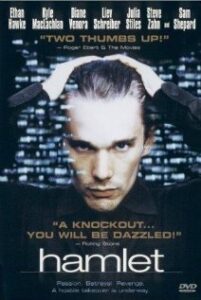
There is something rotten
This is the title of the first chapter by Theodore Dalrymple in the book “The new Vicky syndrome – why European intellectuals surrender to barbarism” (É Realizations, 2016 in portuguese, english original 2010), for those who do not know Hamlet’s phrase about the kingdom of Denmark from which he was a prince, the tragedy written between 1559 and 1601, which talks about the murder of the king, father of Hamlet by his brother Claudius who wants the throne and queen Gertrude (the poster beside the film Hamlet directed and written by Michael Almereyda, 2001) , whose adaptation was criticized but I liked: “the idealism of a young man destroyed by the corruption existing in the world” says a synopsis.
“The new Vicky syndrome – why European intellectuals surrender to barbarism” (É Realizations, 2016 in portuguese, english original 2010), for those who do not know Hamlet’s phrase about the kingdom of Denmark from which he was a prince, the tragedy written between 1559 and 1601, which talks about the murder of the king, father of Hamlet by his brother Claudius who wants the throne and queen Gertrude (the poster beside the film Hamlet directed and written by Michael Almereyda, 2001) , whose adaptation was criticized but I liked: “the idealism of a young man destroyed by the corruption existing in the world” says a synopsis.
He speaks of a richer Europe with greater life expectancy, recalls that Keats, Schubert and Mozart died young (25, 31 and 35 years old respectively), that “the increase in wealth and physical standard of living was impressive in Europe in the last decades” (Dalrymple, 2016, p. 17), and despite this “there is a widespread sense of imminent obliteration, or at least decline, permeating Europe” (p. 18) and I add, of a war with Russia or of an increasingly possible social conflict, now also in England and France.
In order not to wander into psychological cultural ideas and philosophies, some facts cited by Dalrymple, after 12 years of his book (the original in English was published in 2010), seem to correspond to the facts, despite his conservatism cites a “beautiful example” of the Patrick Besson’s book called Haine de la Hollande. Besson sympathizing with the Serbs when NATO launched an offensive against Serbia “as to the subsequent trial of Slobodan Milosevic as major mistakes” and says that NATO “recurred to the very same crimes of which Serbia was accused” (p. 13), to this refers to the previous post when I say use gasoline to put out the fire, and refers to the Netherlands because the jury was in The Hague.
He makes a curious and intelligent sentence about history, which seems to confirm current facts: “fanaticism is resentment in search of power; consumerism is apathy in pursuit of happiness” (p. 15), we talked the week before about what we mean by joy and here it becomes clearer that it cannot be compared to the success of fanatics or the melancholy apathy of those who seek the pleasures of consumerism .
All of this is a preface and precedes chapter 1 “Algo de rotten” which we explained the origin at the beginning, already quoted from the second paragraph a brief summary of the opulence and the fall of what Peter Sloterdijk called the “Empire of the Center” and he also describes the detour from Europe in “If Europe woke up”, we have already made some scores in posts here on this blog.
Among several aspects that the book points out, the topics on Anxiety and Weakness must be read in full to be well understood, its sentence of what is “rotten” can be read when it points out that there is an awareness that the difference “between Europe and good part of the rest of the world, both in terms of wealth and achievement in other spheres, dramatically declines, and in some areas it has reversed, causing the appearance of a major nuisance, even if it was considered inevitable in the long run* ”(here the footnote quotes Disraeli from 1838), and concludes: “no one likes to lose positions in the hierarchy of things” (Dalrymple, 2016, p. 21).
Disraeli’s quote from 1838 when he foresaw that “England will not be the factory of the world”, and this can now be extended to Europe and the rest of the world in relation to food products.
I cite here a work that I came into contact with when I was in Portugal and for which I wrote two texts: “Repensar Portugal”, when the cultured and eclectic priest Manuel Antunes said of Portugal after Salazarism, that it should return to the European continent and forget the ex- colonies, this should apply to the entire European continent now in a dramatic crisis and with threats of totalitarianism and war.
Dalrymple, Theodore (2016). A nova síndrome de Vicky: porque os intelectuais europeus se rendem ao barbarismo. Transl. Maurício G. Righi. Brazil, São Paulo: É realizações, original english 2010.









